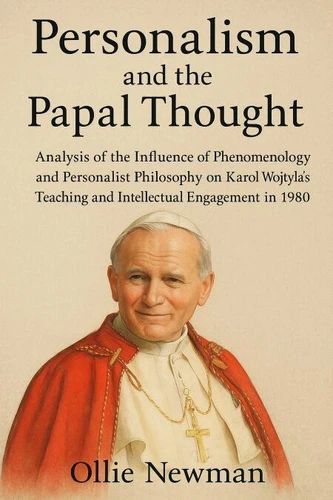Nouveauté
Personalism and the Papal Thought: Analysis of the Influence of Phenomenology and Personalist Philosophy on Karol Wojtyła’s Teaching and Intellectual Engagement in 1980
Par :Formats :
Disponible dans votre compte client Decitre ou Furet du Nord dès validation de votre commande. Le format ePub est :
- Compatible avec une lecture sur My Vivlio (smartphone, tablette, ordinateur)
- Compatible avec une lecture sur liseuses Vivlio
- Pour les liseuses autres que Vivlio, vous devez utiliser le logiciel Adobe Digital Edition. Non compatible avec la lecture sur les liseuses Kindle, Remarkable et Sony
 , qui est-ce ?
, qui est-ce ?Notre partenaire de plateforme de lecture numérique où vous retrouverez l'ensemble de vos ebooks gratuitement
Pour en savoir plus sur nos ebooks, consultez notre aide en ligne ici
- FormatePub
- ISBN8231548286
- EAN9798231548286
- Date de parution08/06/2025
- Protection num.pas de protection
- Infos supplémentairesepub
- ÉditeurWalzone Press
Résumé
This groundbreaking study offers an unparalleled exploration of the philosophical foundations that shaped Pope John Paul II's revolutionary papal teaching in 1980. Delving deep into the rich currents of phenomenology and personalism, it reveals how Karol Wojtyla's unique intellectual synthesis redefined Catholic anthropology, ethics, and social doctrine at a pivotal moment in history. Bridging rigorous academic analysis with accessible insight, Ollie Newman traces the evolution of personalist philosophy-from its early European origins to its decisive imprint on one of the most influential spiritual leaders of the twentieth century.
This book uncovers how Wojtyla's thought embraced the lived experience of the human person, affirming freedom, dignity, and relationality amid the ideological tensions of the Cold War era. With detailed examinations of key papal documents, philosophical treatises, and historical context, this volume illuminates the profound impact of personalism on Church doctrine, human rights advocacy, and global socio-political discourse.
Readers will gain fresh perspectives on the enduring legacy of John Paul II's intellectual engagement-one that continues to inspire faith, freedom, and justice worldwide. Perfect for scholars, students, and anyone fascinated by the intersection of philosophy, theology, and modern history, this book is a vital contribution to understanding the enduring power of personalism in shaping our contemporary world.
This book uncovers how Wojtyla's thought embraced the lived experience of the human person, affirming freedom, dignity, and relationality amid the ideological tensions of the Cold War era. With detailed examinations of key papal documents, philosophical treatises, and historical context, this volume illuminates the profound impact of personalism on Church doctrine, human rights advocacy, and global socio-political discourse.
Readers will gain fresh perspectives on the enduring legacy of John Paul II's intellectual engagement-one that continues to inspire faith, freedom, and justice worldwide. Perfect for scholars, students, and anyone fascinated by the intersection of philosophy, theology, and modern history, this book is a vital contribution to understanding the enduring power of personalism in shaping our contemporary world.
This groundbreaking study offers an unparalleled exploration of the philosophical foundations that shaped Pope John Paul II's revolutionary papal teaching in 1980. Delving deep into the rich currents of phenomenology and personalism, it reveals how Karol Wojtyla's unique intellectual synthesis redefined Catholic anthropology, ethics, and social doctrine at a pivotal moment in history. Bridging rigorous academic analysis with accessible insight, Ollie Newman traces the evolution of personalist philosophy-from its early European origins to its decisive imprint on one of the most influential spiritual leaders of the twentieth century.
This book uncovers how Wojtyla's thought embraced the lived experience of the human person, affirming freedom, dignity, and relationality amid the ideological tensions of the Cold War era. With detailed examinations of key papal documents, philosophical treatises, and historical context, this volume illuminates the profound impact of personalism on Church doctrine, human rights advocacy, and global socio-political discourse.
Readers will gain fresh perspectives on the enduring legacy of John Paul II's intellectual engagement-one that continues to inspire faith, freedom, and justice worldwide. Perfect for scholars, students, and anyone fascinated by the intersection of philosophy, theology, and modern history, this book is a vital contribution to understanding the enduring power of personalism in shaping our contemporary world.
This book uncovers how Wojtyla's thought embraced the lived experience of the human person, affirming freedom, dignity, and relationality amid the ideological tensions of the Cold War era. With detailed examinations of key papal documents, philosophical treatises, and historical context, this volume illuminates the profound impact of personalism on Church doctrine, human rights advocacy, and global socio-political discourse.
Readers will gain fresh perspectives on the enduring legacy of John Paul II's intellectual engagement-one that continues to inspire faith, freedom, and justice worldwide. Perfect for scholars, students, and anyone fascinated by the intersection of philosophy, theology, and modern history, this book is a vital contribution to understanding the enduring power of personalism in shaping our contemporary world.























